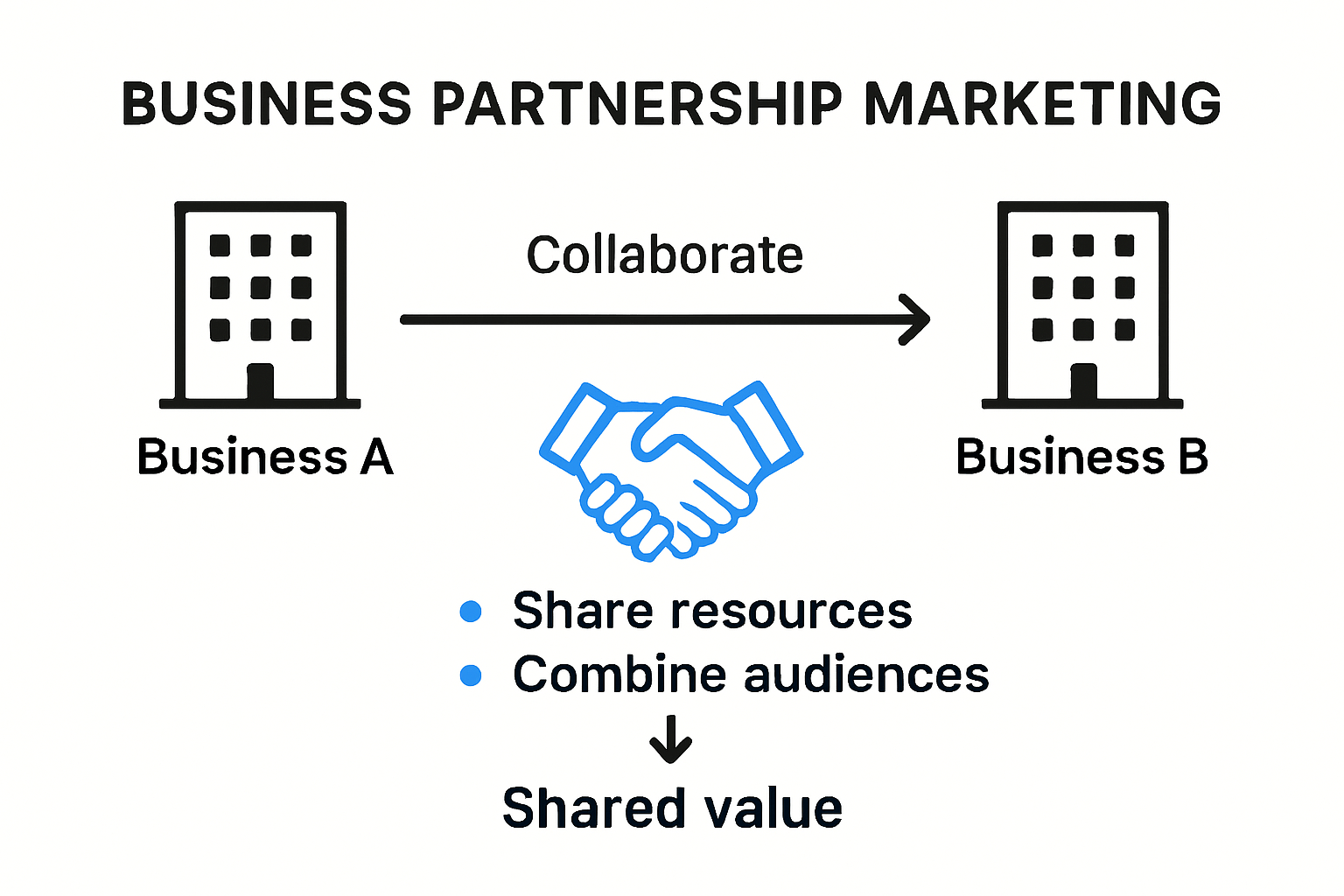Business Partnership Marketing Strategies for Business Owners 2025
Smart business owners are teaming up in new ways to reach bigger markets and grow faster. It might sound like partnerships are just about splitting costs or combining customer lists. The real surprise is that companies in strong partnerships see up to 60 percent higher innovation rates than those going it alone . That shift in thinking is turning partnership marketing into the most powerful growth engine for 2025.
Table of Contents
Quick Summary
| Takeaway | Explanation |
|---|---|
| Partnerships create mutual value. | Collaborating businesses gain access to new customers and resources, enhancing their market reach. |
| Clear objectives drive success. | Establishing precise goals and performance metrics lays a strong foundation for meaningful partnerships. |
| Mitigate risks through communication. | Open communication and relationship-building reduce partnership failures and improve outcomes. |
| Leverage combined strengths for innovation. | Collaborative efforts encourage sharing of ideas and technology, accelerating innovation across businesses. |
| Measure success with comprehensive metrics. | Use diverse performance indicators to evaluate the holistic effectiveness of partnership marketing strategies. |
What Is Business Partnership Marketing
Business partnership marketing represents a strategic approach where two or more businesses collaborate to create mutual value, expand market reach, and achieve shared marketing objectives. At its core, this collaborative strategy goes beyond traditional competitive models, focusing instead on generating synergistic opportunities that benefit all participating organizations.
The Fundamental Mechanics of Partnership Marketing
Partnership marketing operates through deliberate, structured collaborations where businesses combine their unique strengths, resources, and marketing capabilities. According to UK Government Communication Service , this approach involves developing and delivering messages through coordinated efforts across multiple organizational channels. This means businesses can leverage each other’s networks, customer bases, and marketing communication platforms to create more impactful promotional strategies.
The essence of successful business partnership marketing lies in identifying complementary businesses that share similar target audiences but do not directly compete. For instance, a web design company might partner with a digital marketing agency to offer comprehensive online business solutions. Each partner brings specialized expertise, creating a more holistic value proposition for potential clients.

Strategic Benefits and Implementation
Marketing co-operation research highlights that effective partnership marketing can create ‘win-win-win’ scenarios. These collaborative efforts offer advantages to:
- Partnering Companies : Access to new customer segments and shared marketing resources
- Customers : More comprehensive and integrated service offerings
- Overall Market : Enhanced innovation and competitive dynamics
Successful implementation requires careful alignment of business goals, clear communication protocols, and transparent performance metrics. Partners must establish mutual expectations, define specific roles, and create mechanisms for ongoing evaluation and optimization of their joint marketing efforts.
Businesses considering partnership marketing should conduct thorough due diligence, assessing potential partners based on:
- Complementary service capabilities
- Alignment of brand values
- Comparable professional standards
- Potential for mutual growth
- Capacity for effective communication and collaboration
By strategically selecting partners and establishing robust collaborative frameworks, businesses can transform traditional marketing approaches into dynamic, interconnected networks that drive collective success. The future of marketing increasingly depends on these intelligent, symbiotic relationships that transcend individual organizational boundaries.
Key Benefits for US and Colorado Businesses
Business partnership marketing offers transformative advantages for companies across the United States, with particular significance for Colorado’s dynamic business ecosystem. These strategic collaborations provide multifaceted benefits that extend far beyond traditional marketing approaches, enabling businesses to unlock new opportunities and drive sustainable growth.
Economic Expansion and Resource Optimization
Businesses engaging in partnership marketing can dramatically expand their economic potential by pooling resources and accessing new market segments. Colorado State University Pueblo’s Healy Center demonstrates how collaborative initiatives can foster economic development through strategic partnerships. By combining strengths, businesses can:
- Cost Efficiency : Share marketing expenses and reduce individual investment requirements
- Risk Mitigation : Distribute potential financial risks across multiple organizations
- Resource Leveraging : Access complementary skills, technologies, and expertise
For Colorado businesses, these partnerships represent a strategic pathway to overcome local market limitations and create more robust competitive frameworks. Small and medium enterprises particularly benefit from these collaborative models, gaining access to resources typically available only to larger corporations.

Market Reach and Innovation Acceleration
Partnership marketing enables businesses to transcend traditional marketing boundaries. According to Governor Polis’s economic partnership initiative , collaborative efforts can substantially enhance economic mobility and innovation. By creating interconnected business networks, companies can:
- Expand Geographic Reach : Access new customer bases beyond traditional markets
- Cross-Pollinate Innovation : Share technological insights and creative strategies
- Develop Comprehensive Solutions : Create more holistic service offerings
These partnerships become particularly powerful when businesses identify complementary strengths. A technology startup might partner with a marketing agency, while a local manufacturer could collaborate with a logistics provider. Such strategic alignments create synergistic environments where collective capabilities surpass individual limitations.
Competitive Advantage and Sustainable Growth
The most successful business partnership marketing strategies focus on creating mutual value that extends beyond immediate financial gains. By developing trust-based relationships, businesses can establish long-term collaborative frameworks that consistently generate innovative solutions. This approach transforms competitive dynamics, encouraging knowledge sharing and collective problem-solving.
Colorado’s business landscape, characterized by its entrepreneurial spirit and diverse economic sectors, provides an ideal environment for such partnership marketing strategies. Businesses that embrace these collaborative models position themselves at the forefront of economic innovation, capable of adapting quickly to changing market demands and technological advancements.
Ultimately, business partnership marketing represents more than a tactical marketing approach. It embodies a philosophical shift towards interconnected, mutually supportive business ecosystems where collective success becomes the primary objective. For forward-thinking businesses in Colorado and across the United States, these partnerships offer a compelling pathway to sustainable growth and competitive differentiation.
To help readers visualize the main advantages described in this section, the following summary table organizes the core benefits of business partnership marketing for US and Colorado businesses:
| Benefit Area | Description | Example/Impact |
|---|---|---|
| Cost Efficiency | Sharing marketing expenses and reducing financial burden | Split ad campaigns, shared trade show booths |
| Risk Mitigation | Distributing potential financial and market risks across organizations | Less exposure to market downturns for each individual partner |
| Resource Leveraging | Accessing complementary skills, technologies, and expertise | Small businesses use partner’s tech platforms or sales teams |
| Market Reach Expansion | Reaching new geographic or demographic customer segments | Local business gains customers in new states or industries |
| Innovation Acceleration | Sharing ideas and technology to drive creative solutions | New products or service packages created through joint brainstorming |
| Sustainability & Growth | Building long-term frameworks for ongoing success | Stable partnerships lead to ongoing revenue streams |
Best Strategies for Successful Partnerships
Successful business partnership marketing requires strategic planning, thoughtful execution, and a comprehensive approach that goes beyond traditional collaborative models. Businesses must develop robust frameworks that ensure mutual benefit, alignment of goals, and sustainable growth potential.
Establishing Clear Objectives and Expectations
The National Academies of Sciences, Engineering, and Medicine emphasize the critical importance of defining clear objectives and mutual commitments in partnerships. Successful collaborations begin with a detailed roadmap that outlines specific goals, performance metrics, and expected outcomes. This approach requires businesses to:
- Define Precise Deliverables : Create explicit, measurable objectives for the partnership
- Develop Shared Vision : Align strategic goals and organizational values
- Establish Performance Benchmarks : Create transparent mechanisms for evaluating partnership success
Businesses must invest time in comprehensive communication, ensuring all stakeholders understand the partnership’s scope, potential challenges, and anticipated benefits. This initial groundwork prevents misunderstandings and creates a solid foundation for long-term collaboration.
Mitigating Partnership Risks
Research from the International Institute for Management Development reveals three primary reasons for partnership failures: underinvestment, over-appropriation, and misalignment. To counteract these risks, businesses should:
- Conduct thorough due diligence on potential partners
- Develop transparent communication channels
- Create flexible collaboration frameworks
- Implement regular performance reviews
- Build trust through consistent, reliable interactions
Risk mitigation involves more than contractual agreements. It requires developing genuine relationships built on mutual respect, shared values, and a commitment to collective success. Partners must be willing to address challenges proactively and adapt to changing market conditions.
Implementing Structured Collaboration Frameworks
The Association to Advance Collegiate Schools of Business recommends developing structured approaches that emphasize personal relationships and mutual benefits. Successful partnerships require:
- Regular communication and knowledge sharing
- Collaborative problem-solving mechanisms
- Mechanisms for joint innovation and resource development
- Ongoing training and skill exchange programs
- Clear protocols for conflict resolution
Businesses should view partnerships as dynamic ecosystems rather than static agreements. This means creating flexible frameworks that allow for continuous improvement, adaptation, and mutual growth. The most successful partnerships evolve continuously, responding to emerging market opportunities and technological advancements.
Ultimately, successful business partnership marketing transcends transactional interactions. It represents a strategic approach to collaborative growth, where businesses combine their unique strengths to create innovative solutions that neither could achieve independently. By investing in comprehensive partnership strategies, businesses can transform potential challenges into opportunities for collective success.
The following process table summarizes the essential steps for forming and maintaining successful business partnerships, as described in this section:
| Step | Key Actions | Purpose |
|---|---|---|
| Define Objectives & Deliverables | Outline specific, measurable goals for the partnership | Establish shared vision and direction |
| Align Values & Commitment | Ensure both organizations share strategic goals and core values | Build strong foundation and avoid misalignment |
| Conduct Due Diligence | Evaluate potential partners for capability, reliability, and mutual growth | Reduce risk, find compatible partners |
| Create Communication Framework | Set up transparent channels for regular updates and feedback | Prevent misunderstandings, ensure alignment |
| Monitor & Review Performance | Regularly evaluate progress with benchmarks and metrics | Optimize outcomes and facilitate improvements |
| Foster Flexibility & Relationship | Develop trust, adapt to change, and focus on long-term collaboration | Enable sustainability and adaptive success |
Measuring Business Partnership Marketing Success
Measuring the success of business partnership marketing requires a comprehensive approach that goes beyond traditional performance metrics. Businesses must develop sophisticated evaluation frameworks that capture the nuanced value created through collaborative marketing efforts.
Key Performance Indicators for Partnership Effectiveness
Partnership Leaders identifies seven critical metrics for assessing partnership performance. These indicators provide a holistic view of collaborative marketing success:
- Partner Acquisition Cost (PAC) : Evaluates the investment required to establish and maintain partnerships
- Partner Lifetime Value (PLTV) : Measures the total value generated throughout the partnership’s duration
- Joint Sales Pipeline : Tracks collaborative revenue generation and potential opportunities
- Partner Satisfaction Index (PSI) : Assesses the overall health and engagement of the partnership
- Co-Marketing Contribution : Evaluates the combined marketing impact of partnered efforts
- Lead Conversion Rate : Measures the effectiveness of shared marketing strategies
- Partner Churn Rate : Indicates the stability and long-term viability of partnerships
These metrics provide businesses with a multidimensional understanding of partnership performance, moving beyond simple financial measurements to capture the strategic value of collaborative marketing efforts.
Comprehensive Evaluation Frameworks
Phoenix Strategy Group suggests a more extensive approach to partnership assessment. Their research highlights the importance of comprehensive evaluation that includes:
- Financial performance indicators
- Operational efficiency metrics
- Market expansion measurements
- Client satisfaction scores
- Innovation and collaborative potential
Successful measurement requires businesses to develop nuanced evaluation systems that capture both quantitative and qualitative aspects of partnership marketing. This means looking beyond immediate financial returns to understand the strategic value created through collaborative efforts.
Holistic Partnership Assessment
Global Health Knowledge provides a sophisticated framework for assessing partnership dynamics, categorizing evaluation into three critical dimensions:
- Partnership Commitment : Measuring the depth of organizational investment and alignment
- Partnership Mutuality : Evaluating the balance of benefits and shared objectives
- Partnership Outcome : Assessing the tangible and intangible results of collaborative efforts
This approach recognizes that true partnership success extends beyond simple transactional metrics. It requires a deep understanding of the relational dynamics, shared vision, and mutual trust that underpin effective business partnerships.
Businesses must approach partnership marketing measurement as a dynamic, ongoing process. This means developing adaptive evaluation frameworks that can capture the evolving nature of collaborative marketing efforts. Successful measurement is not about creating rigid performance indicators but about developing a nuanced understanding of how partnerships create value, drive innovation, and generate sustainable competitive advantages.
Frequently Asked Questions
What is business partnership marketing?
Business partnership marketing is a strategic approach where two or more businesses collaborate to create mutual value, expand market reach, and achieve shared marketing objectives. It focuses on leveraging each partner’s strengths to drive innovation and growth.
What are the benefits of partnership marketing for businesses in Colorado?
Partnership marketing offers benefits such as cost efficiency, market reach expansion, innovation acceleration, and enhanced competitive advantage. These collaborations can help businesses access new customer segments and share resources effectively.
How can companies ensure successful partnerships?
To ensure successful partnerships, companies should establish clear objectives, align values and commitments, conduct thorough due diligence on potential partners, and implement a robust communication framework. Regular performance reviews and flexibility in collaboration are also crucial.
What key performance indicators should be used to measure partnership success?
Key performance indicators for partnership success include Partner Acquisition Cost (PAC), Partner Lifetime Value (PLTV), joint sales pipeline, Partner Satisfaction Index (PSI), co-marketing contributions, and lead conversion rates. These metrics help assess the effectiveness and overall health of the partnership.
Unleash the True Power of Business Partnerships With a Proven Local Marketing Leader
Are you struggling to turn partnership marketing into measurable business growth? Maybe you have teamed up with other local companies, but still find it hard to expand your reach, generate real leads, or keep your brand ahead of the competition. As highlighted in the article above, most business owners face big obstacles setting clear goals, aligning on strategy, and tracking what actually works in partnership marketing. It is easy to feel stuck or frustrated when collaboration fails to deliver the innovation and customer growth you expect.

At Peak Digital Pro , we help Colorado Springs businesses build powerful digital foundations for partnerships that work. Our expert team combines advanced SEO, AI-driven marketing, and innovative web development to help business owners like you attract the right partners, drive more customers, and get proven results from every collaboration. Stop leaving your growth to chance. Discover how you can join the local market leaders who trust Peak Digital Pro to turn partnership strategy into real-world success. Contact our team today and begin transforming your business partnerships into your strongest growth engine.








